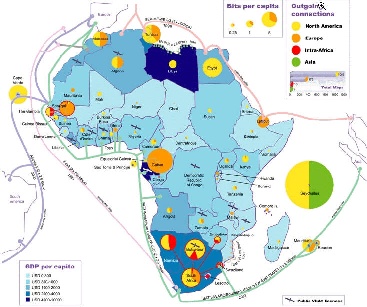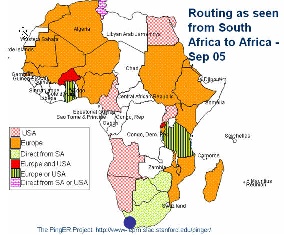...
Looking at the figure below of the routing from the best connected country in Sub Saharan Africa, i.e. South Africa to the rest of Africa in 2005 it is seen that aprt from to Zimbabwe and Botswana traffic was routed via other continents. Not only does this increase costs but it means that In essence the African community is subsidizing the international carriers.
What One thing that is needed is to put into place International eXchange Points (IXPs) between countries to reduce costs and improve performance. This requires users (universities, countries) to band together to leverage influence, get deals etc. There is evidence of this happening in Ubuntunetand the Bandwidth Initiative referred to above. Further the successful launch on December 28 2007 of the RASCOM-1 (named after its parent operator the Regional African Satellite Corporation) is expected to cut costs by providing competition, provide inter-urban links, provide broadband for rural areas, and provide directs links between all African countries.
However, current providers (cable and satellite) have a lot to loose and many of these have close links to regulators and governments (e.g. over 50% of ISPs in Africa are government controlled), so this will be difficult in many cases and may require government intervention. Also the regulatory regimes on the whole are closed and resistant to change, and sometimes ISPs themselves are unwilling to co-operate
...
A survey by Les Cottrell and Monique Petitdidier (reported on at the IHY meeting Ethiopia in November 2007) of leading Universities in 17 African countries showed the following results:
...

